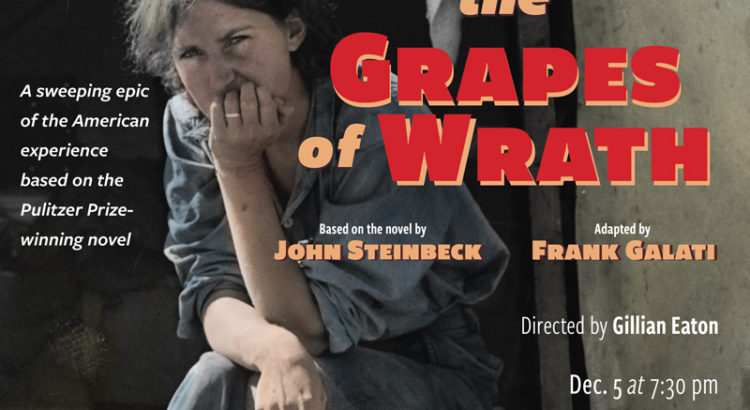First thing I want to say: I haven’t read The Grapes of Wrath. My sense of the story now: sad upon sad upon sad. So many of the characters die or disappear out of hopelessness!
I think it’s hard to make an audience connect with characters in a story that’s pretty relentlessly sad. Acting out tragedy looks exhausting and, honestly, felt a little exhausting to watch. Not that I think tragedy isn’t important or wise. I think it’s both, a lot. I was just reminded, after watching this play, that absorbing it well is a pretty delicate process. I need breaks from tragic circumstances to make me, when those moments come, want to empathize.
It’s in these breaks that I felt the play really shined.
My favorite breaks were the funny ones. I realized that well-done humor was going to make all the difference in the show when the guitar, banjo, and fiddle trio made the revving sounds for the car starting up for the trip. One, two, three false starts. A few of the characters said something like, “Hey, now. Quit playing,” and the whole room changed dynamic. The audience giggled and relaxed. We saw the characters as a little more like us; there was less of a barrier in way of talking, since it was modern English, and the music distracted from the constant, strong Southern (?) accents.
Another very important reason I began to care about the tragic storyline was for the realistic, sensitive portrayal of the mother, or “Ma.” She was a complete joy to watch. She always seemed to mean exactly what she was saying in a way that wasn’t too enthusiastic to be believable, like I felt some of the others risked. She gave Ma a deep sense of poise that none of the others quite pulled off, which gave her character nice dignity and made her performance very easy to believe. Especially for a storyline that hurts a little to buy into, a sad one, her understatedness was a much-needed anchor for my interest. The rest of the actors did an earnest and enthusiastic job, to be sure, but I craved more quiet moments, less accent, and a little more subtlety in how they showed anger and hurt. It felt like a lot of yelling and a lot of face-contorting. Ma matched their seriousness but more naturally, and I felt like she was the most inviting entry for the audience to care about the story.
Thank you, Ma, and thank you, well-timed comedy. You had almost lost me, and even if you bummed me out for a few hours, I appreciate that you tried a play with such a troubled story.


